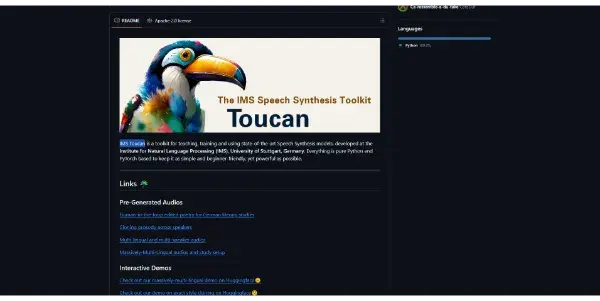IMS Toucan

Free, open-source text-to-speech for over 7,000 languages. You can also train your own models using PyTorch modules
IMS Toucan: A Deep Dive into Open-Source Multilingual Text-to-Speech
IMS Toucan is a groundbreaking free and open-source text-to-speech (TTS) engine boasting support for over 7,000 languages. Built upon the powerful PyTorch framework, it empowers developers with the ability to generate high-quality speech synthesis in a vast array of languages and even offers the capability to train custom models tailored to specific needs. This article explores its functionalities, benefits, applications, and how it stacks up against competitors.
What IMS Toucan Does
IMS Toucan's core function is converting written text into natural-sounding speech. Unlike many TTS systems limited to a handful of widely spoken languages, Toucan provides unprecedented multilingual support, covering a truly global audience. This broad linguistic coverage is achieved through its open-source nature and the ability to train new models, allowing contributions from the community to expand its capabilities continually.
Main Features and Benefits
- Extensive Language Support: The most striking feature is its support for over 7,000 languages, significantly exceeding the capabilities of most commercial and open-source alternatives. This opens up vast possibilities for applications requiring multilingual capabilities.
- Open-Source and Free: The open-source nature of IMS Toucan allows for community contributions, continuous improvement, and transparency. Its free pricing makes it accessible to a wide range of developers and organizations, regardless of budget.
- Custom Model Training: The ability to train custom models using PyTorch is a major advantage. This allows developers to fine-tune the system for specific accents, voices, or even create entirely new voices based on unique datasets. This feature is crucial for achieving high-quality and tailored speech synthesis for specific applications.
- PyTorch Integration: Leveraging PyTorch, a popular and powerful deep learning framework, ensures a robust and flexible architecture, facilitating advanced model development and customization.
Use Cases and Applications
IMS Toucan's broad capabilities unlock a wide range of applications across various sectors:
- Accessibility Technologies: Providing text-to-speech capabilities for individuals with visual impairments, dyslexia, or other reading difficulties across numerous languages.
- Education and Language Learning: Creating immersive language learning experiences and generating spoken examples for educational materials in diverse languages.
- Multilingual Customer Service: Developing chatbots and virtual assistants capable of interacting with customers in their native languages.
- Content Creation: Generating voiceovers for videos, podcasts, and audiobooks in a multitude of languages.
- Research and Development: Serving as a valuable tool for researchers working on speech synthesis, natural language processing, and multilingual technologies.
Comparison to Similar Tools
While several other TTS systems exist, IMS Toucan differentiates itself primarily through its extensive language support and its open-source nature. Commercial TTS solutions often offer high-quality speech but are typically limited in language coverage and incur significant costs. Other open-source options may offer multilingual capabilities but often lack the scale and flexibility provided by Toucan's PyTorch integration and vast language support.
Pricing Information
IMS Toucan is completely free to use. There are no licensing fees or subscription charges associated with its use or distribution. This makes it a highly attractive option for individuals and organizations seeking affordable and powerful multilingual text-to-speech capabilities.
Conclusion
IMS Toucan represents a significant advancement in open-source text-to-speech technology. Its unparalleled multilingual support, coupled with its custom model training capabilities and free accessibility, makes it a valuable asset for developers, researchers, and organizations working with diverse languages and requiring high-quality speech synthesis. The continued growth and contributions to its open-source community promise even greater advancements in the future.